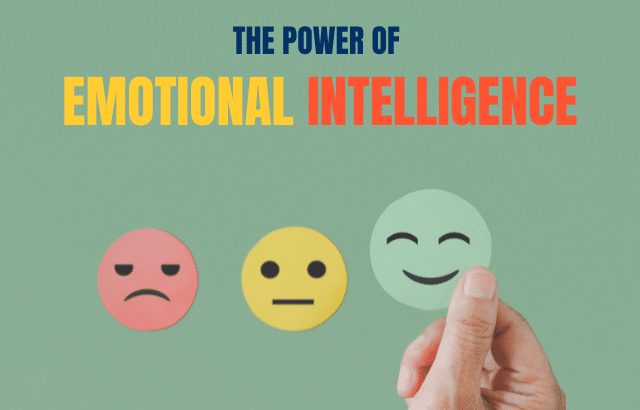Emotional Intelligence Guide: -Emotional Intelligence (EI), often denoted as EQ (Emotional Quotient), emerges as a pivotal aspect of human behavior that extends beyond conventional measures of intelligence. Authored by Hirav Shah, this exploration into the realm of emotional intelligence unveils its profound significance in both personal and professional realms. EI involves a multifaceted approach, encompassing the abilities to recognize, understand, manage, and effectively utilize one’s own emotions, while also being attuned to the emotions of others. Hirav Shah delves into the very definition of Emotional Intelligence, portraying it as the adeptness to not only acknowledge and comprehend one’s own emotional landscape but also to navigate and influence the emotions of those around us. This comprehensive concept includes essential components such as self-awareness, self-regulation, motivation, empathy, and social skills. As an authority on the subject, Hirav Shah emphasizes the critical role that Emotional Intelligence plays in fostering success and well-being, making it an indispensable skill in the intricate tapestry of human interactions
Table of Contents
Why Emotional Intelligence is Important

Emotional Intelligence Guide:
- Enhanced Communication: Individuals with high emotional intelligence are adept at expressing themselves clearly and empathetically. This skill is invaluable in fostering positive communication, resolving conflicts, and building stronger relationships.
- Effective Leadership: Leaders with high emotional intelligence can understand and navigate the emotions of their team members. This helps in creating a positive work environment, boosting morale, and promoting collaboration.
- Conflict Resolution: One of the core aspects of emotional intelligence is the ability to manage conflicts constructively. People with high EQ can navigate disagreements with empathy, finding solutions that benefit all parties involved.
- Stress Management: Emotional intelligence plays a crucial role in managing stress and maintaining mental well-being. Individuals who can regulate their emotions are better equipped to handle challenging situations without succumbing to stress.
- Improved Decision-Making: High EQ individuals are more adept at weighing emotional factors alongside logical considerations when making decisions. This balanced approach often leads to better, more thoughtful choices.
Emotional Intelligence in Literature: There are several notable books that delve into the realm of emotional intelligence. One such acclaimed book is “Emotional Intelligence: Why It Can Matter More Than IQ” by Daniel Goleman. This influential work explores the impact of emotional intelligence on various aspects of life, from personal relationships to professional success.
Emotional Intelligence Guide: Quotes on Emotional Intelligence:

- “Emotional intelligence is the ability to sense, understand, and effectively apply the power and acumen of emotions as a source of human energy, information, connection, and influence.” – Robert K. Cooper
- “The greatest ability in business is to get along with others and to influence their actions.” – John C. Maxwell
- “Your intellect may be confused, but your emotions will never lie to you.” – Roger Ebert
Frequently asked questions and answers on emotional intelligence

What is emotional intelligence (EQ)
Answer: Emotional intelligence (EQ) refers to the ability to recognize, understand, and manage your own emotions as well as the emotions of others. It involves skills such as emotional awareness, empathy, and effective communication.
Why is emotional intelligence important?
Answer: Emotional intelligence is crucial because it helps individuals manage their emotions, build strong relationships, and navigate social complexities. It enhances personal well-being and professional effectiveness.
How can I develop my emotional intelligence?
Answer: Developing emotional intelligence involves practicing self-awareness, improving empathy, and learning to manage your emotions constructively. Techniques include mindfulness, active listening, and seeking feedback.
What are the key components of emotional intelligence?
Answer: The key components of emotional intelligence include self-awareness, self-regulation, motivation, empathy, and social skills. These elements work together to help you understand and manage emotions effectively.
How does emotional intelligence impact leadership?
Answer: Emotional intelligence enhances leadership by improving communication, fostering teamwork, and managing stress. Leaders with high EQ can inspire and motivate their teams, navigate conflicts, and build a positive work environment.
The Impact of Emotional Intelligence on Success and Well-being

Here are some examples illustrating the importance of Emotional Intelligence (EI) in achieving success and well-being:
- Workplace Leadership:
- Example: A manager with high EI recognizes when team members are feeling overwhelmed and adjusts deadlines or offers support. This not only boosts team morale but also enhances productivity and job satisfaction.
- Conflict Resolution:
- Example: During a disagreement between colleagues, an emotionally intelligent individual listens actively to both sides, understands the underlying emotions, and mediates a resolution that addresses the concerns of everyone involved.
- Effective Communication:
- Example: In a business presentation, a speaker with high EI reads the audience’s reactions and adjusts their delivery to engage and connect with listeners more effectively, resulting in a more impactful presentation.
- Personal Relationships:
- Example: In a romantic relationship, one partner uses their EI to recognize and validate their partner’s feelings, leading to a deeper emotional connection and a healthier, more supportive relationship.
- Stress Management:
- Example: An individual with strong self-regulation skills can manage their stress by practicing mindfulness or seeking constructive feedback, thereby maintaining their well-being and performance even in high-pressure situations.
- Career Advancement:
- Example: An employee who is skilled in understanding and managing their own emotions, as well as empathizing with colleagues, is more likely to receive positive feedback and promotions, as they foster a collaborative and positive work environment.
- Customer Service:
- Example: A customer service representative who can read and respond to customers’ emotional states provides better service, turning potential conflicts into opportunities for positive customer experiences.
These examples highlight how Emotional Intelligence contributes to both personal fulfillment and professional success by improving relationships, communication, and overall effectiveness.
Emotional Intelligence Guide:Conclusion

From the insightful perspective provided by Author Hirav Shah, the contemporary landscape places a premium on interpersonal skills, with emotional intelligence emerging as a central element in both personal and professional triumphs. Shah underscores the transformative power of cultivating emotional intelligence, showcasing its potential to elevate communication dynamics, fortify relationships, and sharpen decision-making acumen. As individuals embark on their journey to comprehend and nurture emotional intelligence, Shah’s guidance encourages a recognition that this endeavor is not merely a finite task but rather a lifelong process. Emphasizing the enduring nature of this developmental journey, Shah posits that honing emotional intelligence has the capacity to cast a positive influence across every facet of one’s life, offering a holistic and enduring impact that extends far beyond immediate professional spheres.










